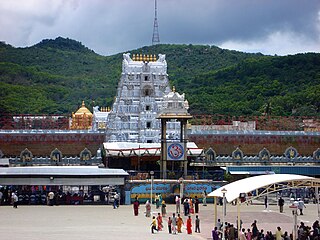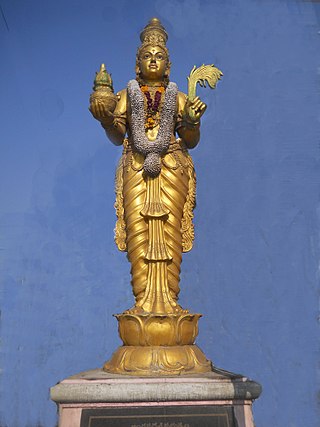Andhra Pradesh is a state in southern India.
Contents
Andhra may also refer to:
Andhra Pradesh is a state in southern India.
Andhra may also refer to:

Andhra Pradesh is a state on the east coast of southern India. It is the seventh-largest state and the tenth-most populous in the country. Telugu, one of India's classical languages, is the primary official language and the most widely spoken language in state and as well as in South India. Ananthapur is the state capital, while the largest city is Visakhapatnam. The state shares borders with Odisha to the northeast, Chhattisgarh to the north, Karnataka to the southwest, Tamil Nadu to the south, Telangana to northwest and the Bay of Bengal to the east. It has the second-longest coastline in India at about 974 kilometres (605 mi).
Banda may refer to:
Anant or Ananta may refer to:
Sarai, Serai, or Saraj may refer to:
Nellore is a city located on the banks of Penna River, in Nellore district of Andhra Pradesh, India. It serves as the headquarters of the district, as well as Nellore mandal and Nellore revenue division. It is the fourth most populous city in the state. It is at a distance of 279 kilometres (173 mi) from Vijayawada, 660 kilometres (410 mi) from Visakhapatnam, 455 kilometres (283 mi) from Hyderabad and about 170 km (110 mi) north of Chennai, Tamil Nadu and also about 380 km (240 mi) east-northeast of Bangalore, Karnataka. It is the administrative headquarters of Nellore District.

Coastal Andhra, also known as Kosta Andhra, is a geographic region in the Indian state of Andhra Pradesh, comprising the coastal districts of the state between the Eastern Ghats and the Bay of Bengal, from the northern border with Orissa to Rayalaseema in the south. It includes major cities such as Visakhapatnam and Vijayawada as well as the state capital Amaravati and is recognized for its fertile lands, rich cultural heritage, and economic importance. Coastal Andhra plays a significant role in the state's agricultural output, particularly in rice and tobacco production, supported by abundant water resources from the Godavari, Krishna, and Penna rivers.

Telangana is a state in India situated in the south-central part of the Indian subcontinent on the high Deccan Plateau. It is the eleventh largest state and the twelfth most populated state in India as per the 2011 census. On 2 June 2014, the area was separated from the northwestern part of United Andhra Pradesh as the newly formed state of Telangana, with Hyderabad as its capital. Telugu, one of the classical languages of India, is the most widely spoken and the primary official language of the state.

Rayalaseema is a geographic region in the Indian state of Andhra Pradesh. It comprises four southern districts of the State, from prior to the districts reorganisation in 2022, namely Kurnool, Anantapur, YSR, and Chittoor. Four new districts were created from these, namely Sri Sathya Sai, Nandyal, Annamayya, and Tirupati. As of 2011 census of India, the western four districts of the region had a population of 15,184,908 and cover an area of 77,424 km2 (29,894 sq mi).

Kurnool is a city in the state of Andhra Pradesh, India. It formerly served as the capital of Andhra State (1953–1956). The city is often referred to as "The Gateway of Rayalaseema". Kurnool is also famous for Diamond hunting as diamonds can be found in the barren land of Kurnool after the top layers of soil are washed away by the monsoon rains. It also serves as the district headquarters of its Kurnool district. As of 2011 census, it is the fifth most populous city in the state with a population of 484,327. It is located on the banks of the Tungabhadra river. Although the area has been inhabited for thousands of years, modern Kurnool was founded in the 16th century CE with the construction of the Konda Reddy Fort.
Kota or KOTA may refer to:
Krishna is a Hindu deity.
Reddy is a Hindu caste predominantly found in the states of Andhra Pradesh and Telangana in South India. They are classified as a forward caste.

Telugu people, also called Āndhras, are an ethno-linguistic group who speak the Telugu language and are native to the Indian states of Andhra Pradesh, Telangana and Yanam district of Puducherry. They are the most populous of the four major Dravidian linguistic groups. Telugu is the fourth most spoken language in India and the 14th most spoken native language in the world. A significant number of Telugus also reside in the Indian states of Karnataka, Tamil Nadu, Orissa, Maharashtra. Members of the Telugu diaspora are spread across countries like United States, Australia, Malaysia, Mauritius, UAE and others. Telugu is the fastest-growing language in the United States. It is also a protected language in South Africa.

North Andhra or Uttara Andhra, also known as Kalinga Andhra, is a geographic region in the Indian state of Andhra Pradesh. It is between the Eastern Ghats and the coast of the Bay of Bengal. It comprises six northern districts of the state, Srikakulam, Parvathipuram Manyam, Vizianagaram, Visakhapatnam, half of the Alluri Sitharama Raju district and Anakapalli. Alluri Sitharama Raju district was carved out of Erstwhile Visakhapatnam and East Godavari districts. So, half of the Alluri Sitharamaraju district belongs to North Andhra/ Uttara Andhra and the southern part of this district belongs to Coastal Andhra region/ Godavari region. As of 2011 census of India, the region with six districts has a population of 9,338,177.

The recorded history of Andhra Pradesh, one of the 28 states of 21st-century India, begins in the Vedic period. It is mentioned in Sanskrit epics such as the Aitareya Brahmana. Its sixth-century BCE incarnation Assaka lay between the Godavari and Krishna Rivers, one of sixteen mahajanapadas. The Satavahanas succeeded them, built Amaravati, and reached a zenith under Gautamiputra Satakarni.
Vijaya may refer to:
Shivaji (1630–1680) was an Indian warrior king and founder of the Maratha Empire.
Goli may refer to:
Nadu a term used to mean land, country, place, domicile, etc. in the Dravidian languages of southern India, north-east Sri Lanka, and south-west Pakistan..

The history of Telangana, located on the high Deccan Plateau, includes its being ruled by the Satavahana Dynasty, the Kakatiya Dynasty (1083–1323), the Musunuri Nayaks (1325–1438), the Delhi Sultanate, the Bahmani Sultanate (1347–1512), Golconda Sultanate (1512–1687) and Asaf Jahi dynasty (1724–1950).